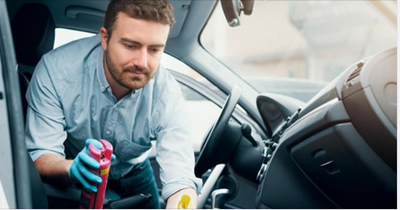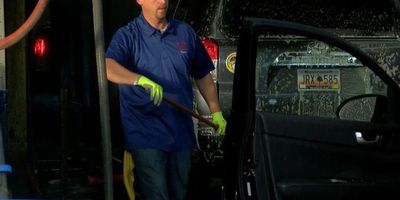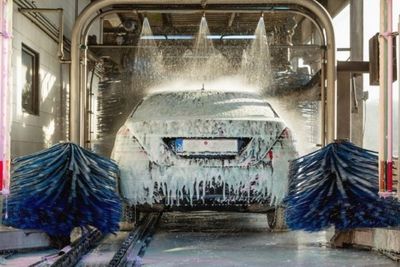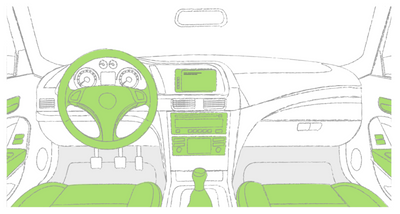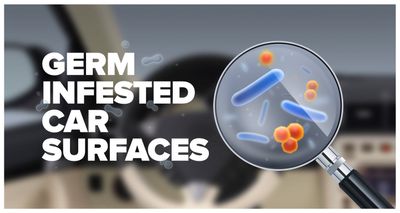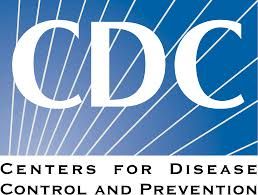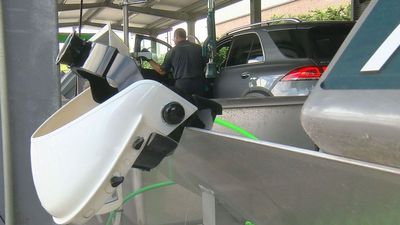In the News
Majority of Americans agree that having a filthy car is a total turn-off
New York Post
When it comes to relationships, seven in 10 believe having a dirty car is a turn-off, according to new research.
A poll of 2,000 American drivers discovered that over half (51%) would go so far as to end a first date early if their date showed up in a dirty car.
In fact, having a messy car is such a massive turn-off that 23% have even ended a relationship with someone because of their filthy vehicle.
The study, conducted by OnePoll in conjunction with Meguiar’s, aimed to discover how people feel about their dirty cars and uncovered nearly half (49%) of respondents admit to having a messy car.
Whether it’s old food wrappers, dirty blankets or expired drinks, 68% of those with messy cars are completely embarrassed to have people in their car, given its filth.
Yet 45% said containing the mess in their cars is overwhelming.
Nearly a quarter (24%) said they avoid cleaning their cars because they know it’ll just get messy again shortly thereafter.
Forty-one percent don’t think it’s all that important to have a tidy car while a further one in five don’t even know where to begin when it comes to cleaning their cars.
moreThe importance of washing your car after a snow storm
Kolbie Satterfield
CHARLESTON, SC (WCSC) - Lowcountry car washes have been seeing more steady business as drivers aim to get the snow residue and salt off their vehicles.
A 57-year employee at "In and Out Car Wash" in West Ashley said it's important you get all that residue off your car before it does permanent damage.
"If you don't have a primer or undercoat, it's going to rust. So it's best to get it off," Perry Capers said.
He said when you're getting your car cleaned, you make sure the underneath of your vehicle gets cleaned as well.
"I would do it as soon as possible," Capers said."The longer you let it sit the more rust is going to set in. Once it starts, it doesn't stop. So it's best to get it off."
According to DMV's site, the undercarriage is the area of your car that's most exposed to the salt which could cause damage if you don't get it removed.
moreHow New Car Wash Technology Saves Water
Megan Pantak | Earth911
As global temperatures continue to warm and droughts increase in number and severity, water is becoming an even more precious and vital resource. Water conservation, in turn, is increasing in importance. Everyday activities, such as washing our cars, now present us with ethical dilemmas as we consider their impact on our environment and natural resources.
Here, we look at water conservation as it pertains to evolving car wash technologies, the growing shift to recycling wash water and the regulation of commercial car washing in the United States.
A Changing Tide in Car Wash Tech
Adding everything from digital payment kiosks to water reclamation technology, commercial car washes are adapting their business practices to fit modern times — and it’s making a big difference. Traditional car washes use between 15 and 85 gallons per vehicle without water conservation equipment. Today’s versions use only eight to 70 gallons per vehicle when equipped with some form of water reclamation and/or filtration tech (depending on the type of car wash).
Though water reclamation technology has been used by professional car washes for the past 30 years, it has gained traction in the past few years as manufacturers and lawmakers aim for quality control and conservation. These reclamation systems are designed to conserve water and control water and sewer hookup costs. They also meet both local and federal regulations.
moreCoronavirus: How to safely clean your car's interior from COVID-19
Janet Loehrke and Veronica Bravo, USA TODAY
With the COVID-19 pandemic upon us, our cars have become our protective bubble as we go out into the world. Just when you thought you were done cleaning your house from the coronavirus, now you need to clean your car. But we need to make sure it's clean from the virus as well. Chances are you already have the cleaning supplies you need to clean your vehicle, and luckily it's not too complicated.
Interior surfaces to clean: High-touch areas
You should start off with the most frequently touched surfaces: the outside and inside door handles, steering wheel, gear shift, turn and wiper signal levers, any buttons on your radio and climate control unit, seat upholstery, seat belts, mirrors, driver and passenger armrests, grab handles and seat adjustment levers on both driver and passenger seats according to Consumer Reports.
Basic products to clean your car
Soap, water and alcohol solutions such as disinfectant wipes that contain at least 70% isopropyl alcohol are the most effective household products to kill the coronavirus according to the Centers for Disease Control and Prevention. Just like washing your hands for 20 seconds, that applies to your car's interior surfaces too. Any product will need a few more seconds to breakdown the virus, so take your time before you wipe it clean.
moreHow often do you clean your car?
One-Third of Drivers Only Clean Their Car Once a Year [Survey]
For many of us, cars are like our second home. They’re our essential transportation for work, dropping the kids off at school, or a set of wheels for a weekend road trip. We spend so much time in our cars, in fact, that a survey from the AAA Foundation for Traffic Safety found that American drivers spend 17,600 minutes behind the wheel each year. That’s equivalent to seven 40-hour workweeks. But despite all that time we spend in the car, very few of us actually keep our vehicles clean. And by clean we don’t just mean an external car wash. The cleanliness of your car interior is more important than many people realize.
In a quest to find out how germy the inside of an average car is, we surveyed 1,000 drivers to see how often people actually vacuum and sanitize the inside of their vehicles. The findings are pretty scary. A shocking 32 percent of drivers rarely clean out the inside of their vehicle — doing so only once a year. Another 12 percent responded that they never even clean the inside of their car.
If you’re part of the one-third of Americans who rarely clean their vehicles, you’ve likely never considered just how many germs are crawling over the surfaces of your car — or where those germs are coming from. There are roughly 700 different strains of bacteria living in the average vehicle, exposing the food you eat in your car and your immune system to some serious dangers.
moreHow to clean your car to reduce the risk of coronavirus
By Mark Elias, Market Watch
Some surfaces in your car’s interior can be damaged by certain cleaners—here are some tips:
It is impossible to turn on the television, radio, see a newspaper or talk with a neighbor without hearing about the coronavirus disease (COVID-19). What is it and can it make your vehicle sick?
We at Kelley Blue Book want to help you make informed decisions on what the best practices are to keep your vehicle as clean as possible while reducing the spread of the virus.
What is the coronavirus?
Coronaviruses are viruses that commonly circulate among humans and cause mild illnesses like the common cold. The novel coronavirus is a new, previously unidentified, strain.
The virus was first detected in Wuhan City, Hubei Province, China. The first infections link to a live animal market. It spreads quickly from person to person. It is now spreading through the community. Containment recommendations include a quarantine in place and constantly cleaning surfaces for at least a 14-day period.
Consulting with a doctor and submitting for medical tests will ensure that you are either past the point of infection or not carrying the virus. Either way, it is essential to keep in contact with your medical practitioner until they give you the “all clear.”
moreCleaning and Disinfection for Non-emergency Transport Vehicles
Centers for Disease Control and Prevention
People who are known or suspected to have COVID-19 may use non-emergency vehicle services, such as passenger vans, accessible vans, and cars, for transportation to receive essential medical care. When transporting a known confirmed positive passenger, it is recommended that drivers wear an N95 respirator or facemask (if a respirator is not available) and eye protection such as a face shield or goggles (as long as they do not create a driving hazard), and the passenger should wear a facemask or cloth face covering. Occupants of these vehicles should avoid or limit close contact (within 6 feet) with others. The use of larger vehicles such as vans is recommended when feasible to allow greater social (physical) distance between vehicle occupants. Additionally, drivers should practice regular hand hygiene, avoid touching their nose, mouth, or eyes, and avoid picking up multiple passengers who would not otherwise be riding together on the same route. CDC recommends that individuals wear cloth face coverings in settings where other social distancing measures are difficult to maintain, especially in areas with significant community transmission. Cloth face coverings may prevent people who don’t know they have the virus from transmitting it to others; these face coverings are not surgical masks, respirators, or personal protective equipment (PPE). Cloth face coverings should not be placed on young children under age 2, anyone who has trouble breathing, or is unconscious, incapacitated or otherwise unable to remove the mask without assistance.
moreDoctors advise sanitizing your vehicle during COVID-19 pandemic
By Carmen Poe | WAFB
Doctors at Baton Rouge General say while you’re busy sanitizing all the hotspots, don’t forget your car.
A quick trip to the car wash and the outside of vehicles look like they just rolled off the lot but what about the inside.
“I feel like it should be disinfected all the way around,” said Jana Joiner, a nurse.
The good thing for this nurse on the front lines is the workers at Benny’s Car Wash think so, too. Employees who are gloved and masked up bookend the interior detail service with disinfectant at the Benny’s Car Wash on Siegen Lane.
General manager Kevin Hunter said the cleaning process starts with driver’s blasting the air.
“We want it to circulate,” Hunter said. “We want it to go through the air conditioner. That way, any particles or virus in the air conditioner, we’re going to get a good chance to attack that.”
The spray disinfectant attacks any possible germs.
“We’re going to let the air conditioner do the work,” he added.
It takes about a minute for the chemical to work, Hunter noted. Then, cars roll through the normal cleaning routine. Cracks that the owners might forget to wipe are given a little elbow grease.
Nurse Joiner understands the need for extra cleaning measures. She doesn’t enter the house wearing her scrubs and uses hand sanitizer throughout the day.
more
